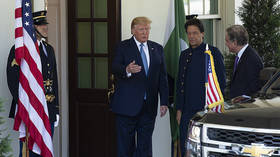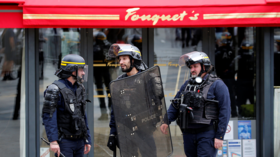Trump-Khan meeting: What does US want from Pakistan & will Islamabad kowtow to pressure?

Pakistan’s Prime Minister Imran Khan’s recent meeting with Donald Trump has been chock-a-block with typical gaffes we have come to expect from having a reality TV star running the show from inside the White House.
By all accounts, Khan’s recent visit to the United States has been a blinding success. The trip started with an official snub from the Trump administration, with Khan arriving over the weekend at a non-existent meet and greet before boarding an ordinary airport shuttle (even I don’t use those). According to Pakistani media, there was not one single representative present from the US State Department to greet Khan as he landed, a move so brazen that newspapers had to send requests to the State Department for comment.
In anticipation of the meeting, Trump released a well-informed tweet last Thursday that Hafiz Saeed, the alleged “mastermind of the Mumbai Terror attacks” has been found after a “ten-year search.” The ten-year search is of course, complete nonsense, given he was under house-arrest in Lahore and subsequently released in November 2017.
Having a surge of confidence with such in-depth knowledge of the region, Trump allegedly also told Khan during their meeting that he “was with Prime Minister Modi two weeks ago [at the G20 summit], and we talked about this subject [of Kashmir], and he actually said, ‘Would you like to be a mediator or arbitrator?’ I said, ‘Where?’ He said, ‘Kashmir’… I think they’d like to see it resolved, and you’d like to see it resolved, and if I can help, I’d love to be a mediator…”
Also on rt.com ‘No such request made’: India DENIES Trump was asked to mediate Kashmir crisisKhan welcomed the news, given that Pakistan has long sought outside mediation on the issue of Kashmir. India, on the other hand, has not publicly indicated any such desire and has maintained that Kashmir is a bilateral dispute that must be resolved between Islamabad and New Delhi alone, as evidenced by a recent tweet from the official spokesperson of India’s Ministry of External Affairs.
My personal favourite, however, is Trump’s claim that he could win the war in Afghanistan in as little time as a week. The only thing stopping him from doing so, is that he doesn’t want to kill 10 million people and/or wipe Afghanistan off the face of the earth. Of course he doesn’t want to wipe Afghanistan off the map – what would we do without all the opium? Not to mention that, according to the CIA, Afghanistan has a population of at least 34 million, so it is unclear what Trump is proposing to happen to the other 24 million residents. Presumably, the surviving Afghans of Trump’s one-week war will become refugees that Trump could then stare in the face and tell to go home.
Also on rt.com ‘I don’t want to kill 10 million people’: Trump says he could win Afghanistan war in 10 daysI suppose the point I am trying to make is that one can make legitimate claims about Pakistan and all of the areas that Trump should seek to target Pakistan’s domestic and foreign policy as points for reform, but at the end of the day, Khan is dealing with someone who is either completely incompetent or is insistent on playing a buffoon at every occasion to no apparent end. Either way, the result is the same.
For example, according to the Washington Post, Trump should have pressed Khan on Pakistan’s crackdown on press freedom. That’s right. The administration attempting its utmost to prosecute an Australian citizen who was publishing leaked information – to which the Washington Post has offered little to no meaningful assistance to the defense of this individual – should press Pakistan on its crackdown on press freedom. Was it not a Washington Post contributor who was brutally murdered by a close Trump ally in Saudi Arabia – to which Trump did nothing? Why would he care about press freedom in Pakistan?
READ MORE: Trump says he prefers Pakistani reporters in the Oval Office in latest attack on US media
The obvious immediate goal of the US with respect to Pakistan, as detailed by most media reports, is linked to Pakistan’s relationship with terrorism, its proximity to Afghanistan and its position to help end or wind down the conflict in its war torn neighbour.
Right now, Pakistan finds itself on the Financial Action Task Force “gray list” which is causing the country to lose out on approximately $10 billion annually, which undoubtedly would have been at the forefront of Khan’s entire purpose while meeting Trump. I would venture to say that, aside from the obvious issues of terrorism and Afghanistan, in order for Pakistan to come off this list and reinstate its economy without resorting to IMF loans and Saudi/UAE grants, the topics of Iran and China must have been raised with Khan at least to a certain extent.
Also on rt.com ‘Nuclear war is not an option’: Pakistani PM says he’d give up nukes if India did so tooOr is it a coincidence that, even while Khan was at Trump’s side, Trump was blasting Tehran to reporters calling Iran “the number one state of terror in the world”? Is it also a coincidence that Trump’s remarks came at the same time Washington announced it was placing a leading Chinese oil importer, Zhuhai Zhenrong, on its sanctions blacklist for continuing to trade Iranian crude? As even the BBC noted (at the last line of its article, mind you) “Imran Khan must tread a delicate path between Mr Trump’s America and its economic arch-rival, Beijing.”
That is not to say that Trump probably is quite determined to wind down the war in Afghanistan and begin bringing some 14,000 American soldiers home, as per his election promises (as well as bring an end to an approximate $45 billion annually on defence spending in the war torn nation). While he has found alternative and colourfully racist means of continuing to remind his support base that he has not completely abandoned them, sooner or later people will probably begin asking questions if Trump not only continues the Bush and Obama-era wars, but opens up a third, fourth or fifth battle venue in Iran, Venezuela, or even North Korea.
And even intertwined in the issue of Afghanistan is the maintenance of outstanding disputes with Iran and China, both of whom have an interest in Afghanistan as well. If Trump’s sole aim was to handle the question of Afghanistan and to use Pakistan to that end, he would still be faced with the emerging and unresolved presence of Iran and China and Pakistan’s close relationship with those two nations.
Also on rt.com US sanctions Chinese company, big buyer of Iranian oilAs Sherry Rehman, Pakistani politician and former diplomat wrote in Foreign Policy:
“Khan needs to be able to tactfully telegraph this worry and protect Pakistan from getting caught in the crosshairs of hard new alignments in the region. The obvious structural shift that will impact the US-Pakistan equation is Washington’s desire to contain China.
“The US alignment with India is neither new nor surprising. But the recent US identification of China as a strategic threat at a policy level places Pakistan in a zero-sum game, lodged firmly in the China camp with its attendant benefits and risks.”
Where this all leaves US-Pakistan relations in the interim is unclear. In March, Trump previously told reports that he thought his administration’s relationship with Pakistan right now “is very good.” This is despite many fierce Twitter attacks on Pakistan by Trump and the substantial cuts to Pakistan’s aid. Trump’s relationship with Khan will also be mired by a recently published report on human rights practices in Pakistan by the US State Department, which noted, among others:
“Human rights issues included credible reports of extrajudicial and targeted killings; forced disappearances; torture; arbitrary and lengthy pretrial detention; arbitrary or unlawful interference with privacy; censorship, site-blocking, and arbitrary restrictions on journalists’ freedom of movement; severe harassment and intimidation of and high-profile attacks against journalists and media organizations…” (and the list continues)
READ MORE: Mumbai 26/11 attack mastermind Hafiz Saeed arrested in Pakistan
Given Washington’s relationship with human rights abusers – and its long list of documented criminal actions – it is unlikely that the US would want Pakistan to urgently reform its practices before it decides to remove its name from the so-called “gray list.” It appears more likely that Pakistan will have to kowtow in certain directions in respect of Afghanistan, Iran, and especially China.
The recent arrest of Hafiz Saeed may indeed be part and parcel of Trump’s overall list of demands for Khan, given his tweet last week hinted at “great pressure” put on Pakistan to reign Saeed in. In this context, we may see US-Pakistan coordination increasing in the rest of the 2019 year ahead.
Like this story? Share it with a friend!
The statements, views and opinions expressed in this column are solely those of the author and do not necessarily represent those of RT.














